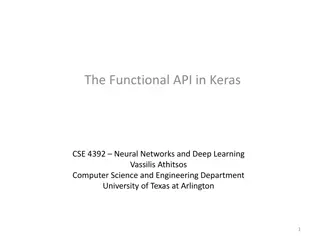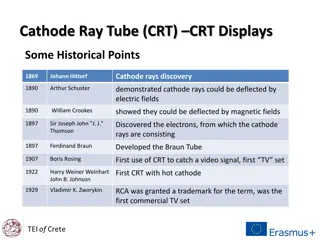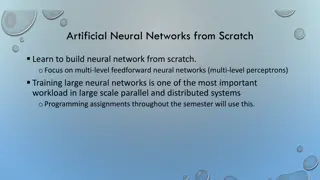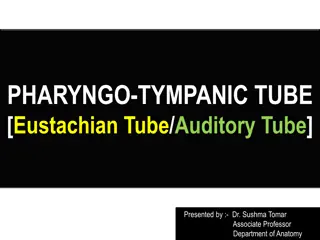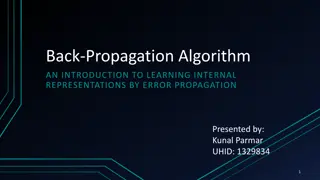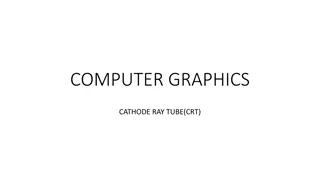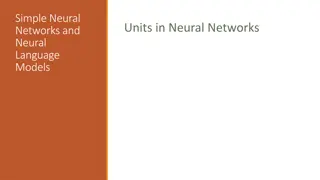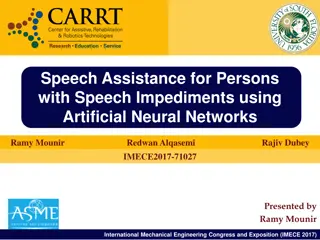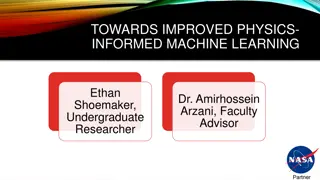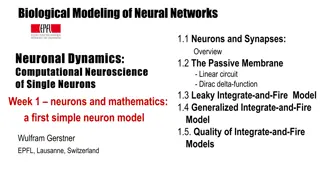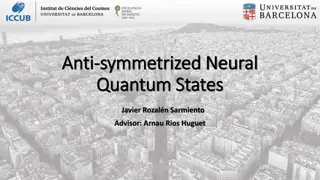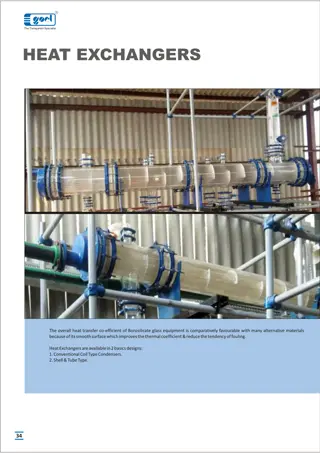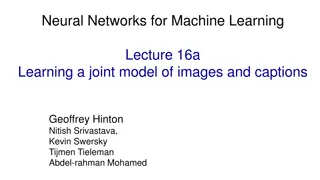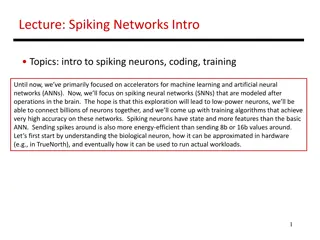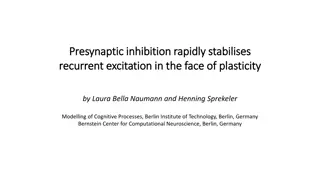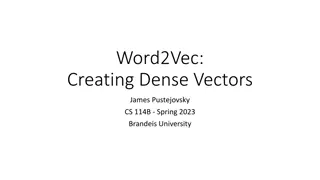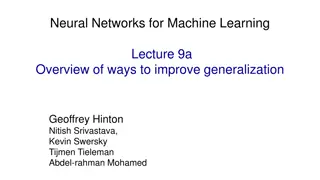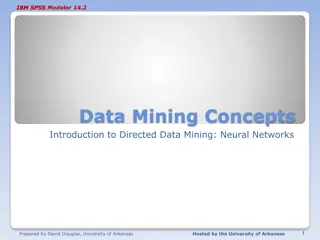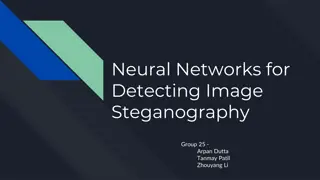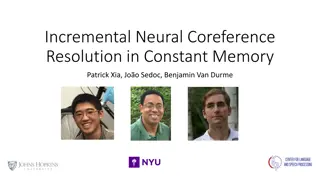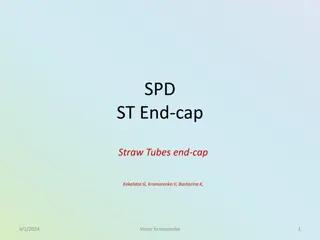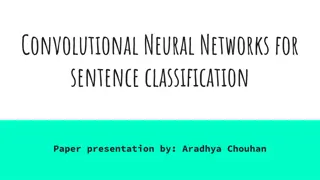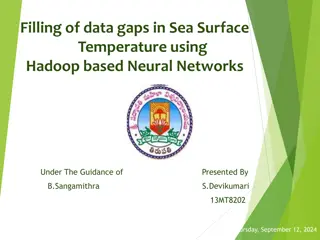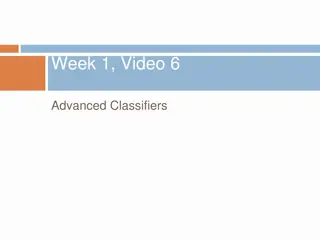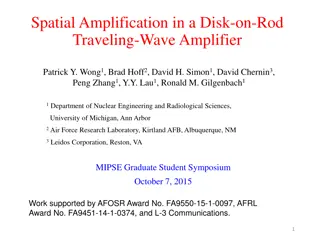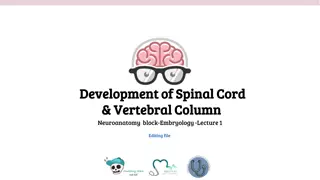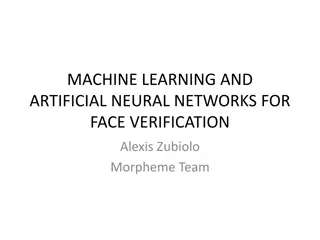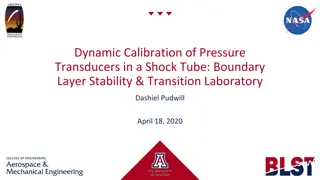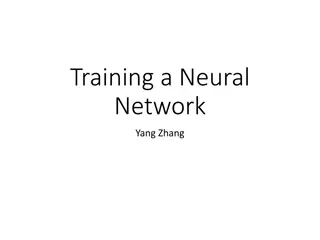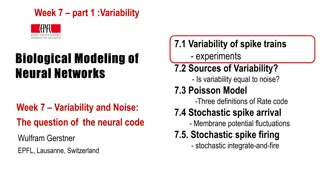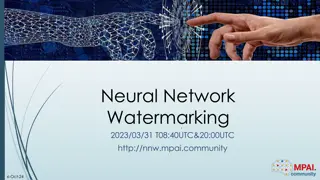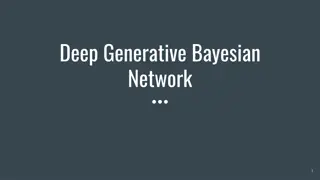Introduction to Deep Learning: Neural Networks and Multilayer Perceptrons
Explore the fundamentals of neural networks, including artificial neurons and activation functions, in the context of deep learning. Learn about multilayer perceptrons and their role in forming decision regions for classification tasks. Understand forward propagation and backpropagation as essential
3 views • 74 slides
Rainfall-Runoff Modelling Using Artificial Neural Network: A Case Study of Purna Sub-catchment, India
Rainfall-runoff modeling is crucial in understanding the relationship between rainfall and runoff. This study focuses on developing a rainfall-runoff model for the Upper Tapi basin in India using Artificial Neural Networks (ANNs). ANNs mimic the human brain's capabilities and have been widely used i
0 views • 26 slides
Understanding Recurrent Neural Networks (RNN) and Long Short-Term Memory (LSTM)
Recurrent Neural Networks (RNNs) and Long Short-Term Memory (LSTM) are powerful tools for sequential data learning, mimicking the persistent nature of human thoughts. These neural networks can be applied to various real-life applications such as time-series data prediction, text sequence processing,
15 views • 34 slides
Enteral Tube Use and Maintenance in Brampton and Surrounding Areas
Discover the comprehensive services provided by the William Osler Nurse Practitioner Led Outreach Team in Brampton, North Etobicoke, West Woodbridge, Malton, and Bramalea. Learn about indications for enteral tube use, different types of enteral tubes, maintenance strategies, and more. Explore essent
5 views • 17 slides
Understanding Mechanistic Interpretability in Neural Networks
Delve into the realm of mechanistic interpretability in neural networks, exploring how models can learn human-comprehensible algorithms and the importance of deciphering internal features and circuits to predict and align model behavior. Discover the goal of reverse-engineering neural networks akin
6 views • 31 slides
Graph Neural Networks
Graph Neural Networks (GNNs) are a versatile form of neural networks that encompass various network architectures like NNs, CNNs, and RNNs, as well as unsupervised learning models such as RBM and DBNs. They find applications in diverse fields such as object detection, machine translation, and drug d
2 views • 48 slides
Understanding Keras Functional API for Neural Networks
Explore the Keras Functional API for building complex neural network models that go beyond sequential structures. Learn how to create computational graphs, handle non-sequential models, and understand the directed graph of computations involved in deep learning. Discover the flexibility and power of
1 views • 12 slides
Evolution of Cathode Ray Tube (CRT) Displays: Historical Milestones
The historical evolution of Cathode Ray Tube (CRT) displays is highlighted, starting from the discovery of cathode rays in 1869 by Johann Hittorf to the development of the first commercial TV set by RCA in 1929. Key milestones include the demonstration of electron deflection by electric and magnetic
0 views • 46 slides
Understanding Artificial Neural Networks From Scratch
Learn how to build artificial neural networks from scratch, focusing on multi-level feedforward networks like multi-level perceptrons. Discover how neural networks function, including training large networks in parallel and distributed systems, and grasp concepts such as learning non-linear function
1 views • 33 slides
Anatomy of the Pharyngo-Tympanic Tube (Eustachian Tube) Explained
The pharyngo-tympanic tube, also known as the Eustachian tube or auditory tube, is a vital structure connecting the nasopharynx with the tympanic cavity. It plays a crucial role in maintaining air pressure equilibrium on both sides of the tympanic membrane. Comprising bony and cartilaginous parts, i
0 views • 14 slides
Understanding Back-Propagation Algorithm in Neural Networks
Artificial Neural Networks aim to mimic brain processing. Back-propagation is a key method to train these networks, optimizing weights to minimize loss. Multi-layer networks enable learning complex patterns by creating internal representations. Historical background traces the development from early
1 views • 24 slides
Understanding Cathode Ray Tube (CRT) Technology in Computer Graphics
Explore the technology of Cathode Ray Tube (CRT) used in traditional computer monitors and televisions. Learn about its components such as the electron gun, control electrode, focusing system, deflection yoke, and phosphorus-coated screen. Discover how a CRT works through the movement of electron be
1 views • 7 slides
A Deep Dive into Neural Network Units and Language Models
Explore the fundamentals of neural network units in language models, discussing computation, weights, biases, and activations. Understand the essence of weighted sums in neural networks and the application of non-linear activation functions like sigmoid, tanh, and ReLU. Dive into the heart of neural
0 views • 81 slides
Assistive Speech System for Individuals with Speech Impediments Using Neural Networks
Individuals with speech impediments face challenges with speech-to-text software, and this paper introduces a system leveraging Artificial Neural Networks to assist. The technology showcases state-of-the-art performance in various applications, including speech recognition. The system utilizes featu
1 views • 19 slides
Advancing Physics-Informed Machine Learning for PDE Solving
Explore the need for numerical methods in solving partial differential equations (PDEs), traditional techniques, neural networks' functioning, and the comparison between standard neural networks and physics-informed neural networks (PINN). Learn about the advantages, disadvantages of PINN, and ongoi
0 views • 14 slides
Exploring Biological Neural Network Models
Understanding the intricacies of biological neural networks involves modeling neurons and synapses, from the passive membrane to advanced integrate-and-fire models. The quality of these models is crucial in studying the behavior of neural networks.
0 views • 70 slides
Exploring Neural Quantum States and Symmetries in Quantum Mechanics
This article delves into the intricacies of anti-symmetrized neural quantum states and the application of neural networks in solving for the ground-state wave function of atomic nuclei. It discusses the setup using the Rayleigh-Ritz variational principle, neural quantum states (NQSs), variational pa
0 views • 15 slides
Heat Exchanger – Shell & Tube | Goel Scientific | Canada
We serve the best Shell & Tube, Shell & Tube, Manufacturer, Supplier, Seller, in Canada, USA Alberta, Calgary, British Columbia, Vancouver, Ontario, Quebec
1 views • 7 slides
Learning a Joint Model of Images and Captions with Neural Networks
Modeling the joint density of images and captions using neural networks involves training separate models for images and word-count vectors, then connecting them with a top layer for joint training. Deep Boltzmann Machines are utilized for further joint training to enhance each modality's layers. Th
4 views • 19 slides
Understanding Spiking Neurons and Spiking Neural Networks
Spiking neural networks (SNNs) are a new approach modeled after the brain's operations, aiming for low-power neurons, billions of connections, and high accuracy training algorithms. Spiking neurons have unique features and are more energy-efficient than traditional artificial neural networks. Explor
5 views • 23 slides
Role of Presynaptic Inhibition in Stabilizing Neural Networks
Presynaptic inhibition plays a crucial role in stabilizing neural networks by rapidly counteracting recurrent excitation in the face of plasticity. This mechanism prevents runaway excitation and maintains network stability, as demonstrated in computational models by Laura Bella Naumann and Henning S
0 views • 13 slides
Understanding Word2Vec: Creating Dense Vectors for Neural Networks
Word2Vec is a technique used to create dense vectors to represent words in neural networks. By distinguishing target and context words, the network input and output layers are defined. Through training, the neural network predicts target words and minimizes loss. The hidden layer's neuron count dete
7 views • 12 slides
Strategies for Improving Generalization in Neural Networks
Overfitting in neural networks occurs due to the model fitting both real patterns and sampling errors in the training data. The article discusses ways to prevent overfitting, such as using different models, adjusting model capacity, and controlling neural network capacity through various methods lik
0 views • 39 slides
Introduction to Neural Networks in IBM SPSS Modeler 14.2
This presentation provides an introduction to neural networks in IBM SPSS Modeler 14.2. It covers the concepts of directed data mining using neural networks, the structure of neural networks, terms associated with neural networks, and the process of inputs and outputs in neural network models. The d
0 views • 18 slides
Detecting Image Steganography Using Neural Networks
This project focuses on utilizing neural networks to detect image steganography, specifically targeting the F5 algorithm. The team aims to develop a model that is capable of detecting and cleaning hidden messages in images without relying on hand-extracted features. They use a dataset from Kaggle co
0 views • 23 slides
Incremental Neural Coreference Resolution: Constant Memory Approach
This research delves into Incremental Neural Coreference Resolution using a Limited-memory algorithm for efficient processing while addressing memory constraints. It explores techniques such as neural components and explicit entity representations, making advancements in resolving coreference in lon
2 views • 31 slides
Study of Prototype Straw Tube End-cap Technology
The content describes the design and assembly of a 1-meter prototype for straw tube end-cap technology. Details include the structure of the detector layers forming coordinate systems, construction on a rigid flat table, stretching of straw tubes, effects of humidity on tube elongation, and the use
0 views • 11 slides
Convolutional Neural Networks for Sentence Classification: A Deep Learning Approach
Deep learning models, originally designed for computer vision, have shown remarkable success in various Natural Language Processing (NLP) tasks. This paper presents a simple Convolutional Neural Network (CNN) architecture for sentence classification, utilizing word vectors from an unsupervised neura
0 views • 15 slides
Enhancing Sea Surface Temperature Data Using Hadoop-Based Neural Networks
Large-scale sea surface temperature (SST) data are crucial for analyzing vast amounts of information, but face challenges such as data scale, system load, and noise. A Hadoop-based Backpropagation Neural Network framework processes SST data efficiently using a Backpropagation algorithm. The system p
2 views • 24 slides
Understanding Advanced Classifiers and Neural Networks
This content explores the concept of advanced classifiers like Neural Networks which compose complex relationships through combining perceptrons. It delves into the workings of the classic perceptron and how modern neural networks use more complex decision functions. The visuals provided offer a cle
0 views • 26 slides
Understanding Neural Processing and the Endocrine System
Explore the intricate communication network of the nervous system, from nerve cells transmitting messages to the role of dendrites and axons in neural transmission. Learn about the importance of insulation in neuron communication, the speed of neural impulses, and the processes involved in triggerin
0 views • 24 slides
Spatial Amplification in Disk-on-Rod Traveling-Wave Amplifier Study
Explore the viability of Disk-on-Rod Traveling Wave Tube (TWT) for high-power microwave devices with wide bandwidth. Analyze the spatial amplification rate through hot-tube dispersion relations, comparing against Particle-in-Cell code simulations. Schematic diagrams and cold-tube dispersion relation
0 views • 13 slides
Embryology of Spinal Cord and Vertebral Column Development
Explore the fascinating embryological journey of the spinal cord and vertebral column development, covering topics such as neural tube formation, layers of the spinal cord, subdivisions of mantle and marginal zones, chondrification, ossification stages, spina bifida types, and more. Dive into the st
1 views • 15 slides
Neural Network Control for Seismometer Temperature Stabilization
Utilizing neural networks, this project aims to enhance seismometer temperature stabilization by implementing nonlinear control to address system nonlinearities. The goal is to improve control performance, decrease overshoot, and allow adaptability to unpredictable parameters. The implementation of
0 views • 24 slides
Machine Learning and Artificial Neural Networks for Face Verification: Overview and Applications
In the realm of computer vision, the integration of machine learning and artificial neural networks has enabled significant advancements in face verification tasks. Leveraging the brain's inherent pattern recognition capabilities, AI systems can analyze vast amounts of data to enhance face detection
0 views • 13 slides
Dynamic Calibration of Pressure Transducers in a Shock Tube
This study focuses on the dynamic calibration of pressure transducers in a shock tube to understand boundary layer stability and transition. By creating a shock to impact a Kulite pressure transducer mounted at the end of the tube, researchers aim to determine key parameters such as resonance, dampi
0 views • 11 slides
Understanding Neural Network Training and Structure
This text delves into training a neural network, covering concepts such as weight space symmetries, error back-propagation, and ways to improve convergence. It also discusses the layer structures and notation of a neural network, emphasizing the importance of finding optimal sets of weights and offs
0 views • 31 slides
Exploring Variability and Noise in Neural Networks
Understanding the variability of spike trains and sources of variability in neural networks, dissecting if variability is equivalent to noise. Delving into the Poisson model, stochastic spike arrival, and firing, and biological modeling of neural networks. Examining variability in different brain re
0 views • 71 slides
Understanding Neural Network Watermarking Technologies
Neural networks are being deployed in various domains like autonomous systems, but protecting their integrity is crucial due to the costly nature of machine learning. Watermarking provides a solution to ensure traceability, integrity, and functionality of neural networks by allowing imperceptible da
0 views • 15 slides
Understanding Deep Generative Bayesian Networks in Machine Learning
Exploring the differences between Neural Networks and Bayesian Neural Networks, the advantages of the latter including robustness and adaptation capabilities, the Bayesian theory behind these networks, and insights into the comparison with regular neural network theory. Dive into the complexities, u
0 views • 22 slides






